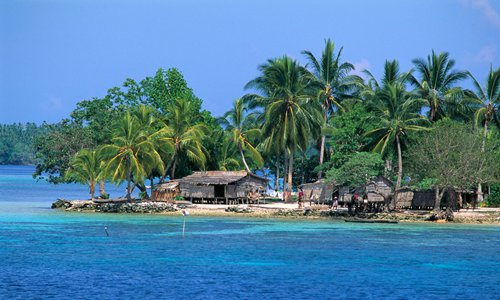HOME >> BUSINESS
Solomon Islands could be new Pacific hub for Chinese investments
Source:Global Times Published: 2019/9/19 22:23:42

A village in the Solomon Islands File Photo: IC
The Solomon Islands' decision to cut diplomatic ties with the island of Taiwan and acknowledge the one-China principle may attract more investment from the Chinese mainland and help the local economy, an expert has said.As an economically underdeveloped country, the Solomon Islands has a lot to offer for Chinese investors, particularly in areas where China has a technological advantage, Zhao Shaofeng, an associate professor from the Pacific Islands Research Center at Liaocheng University in East China's Shandong Province, told the Global Times.
Agriculture, forestry and fisheries are the main economic pillars. It mainly exports wood, fish and products such as cocoa and coconut. Most daily necessities, home appliances, rice, industrial manufactured goods and petroleum are imported, Zhao said.
Locals largely rely on working in Australia and New Zealand for income, or working in local restaurants and businesses. The average monthly wage on the Solomon Islands is 2,000 to 3,000 yuan ($281 to $422), according to Zhao.
The Solomon Islands' tourism and hospitality industry is a potential economic growth sector that will change significantly as diplomatic relations with the mainland are established, Zhao said, adding that local wood production and processing, fishery resources and infrastructure construction will have great potential for development as well.
"The island country pays great attention to sustainable development. China has mature solar technology, which will have a lot of room for development in the Solomon Islands," Zhao said.
According to Zhao, the Solomon Islands could be a land of opportunity for Chinese investors, as long as they respect local culture and abide by local laws and regulations.
The Solomon Islands is a suitable destination for engineering companies in China that are capable of undertaking international construction projects, Zhao said.
"They can improve the local infrastructure. Of course, some companies that are capable of growing crops, as well as fishing and animal husbandry companies and so on, can also go to invest there."
Investors from the mainland will need to take into account the local customs, Zhao said.
"Some investors like to buy land in island countries, and it is important to confirm whether or not the land is subject to any disputes, such as if it is publicly owned or private land," he said.
Posted in: ECONOMY